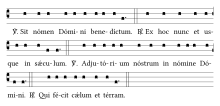Versicle

A versicle (from Latin versiculus, short verse) is a short two- or four-line verse that is sung or recited in the liturgy alternating between the celebrant, hebdomadarian or cantor) and the congregation. It is usually a psalm verse in two parts. A series of versicles and responses forms the preces.[1] The versicle is sung recitatively on a note with a simple cadence.
The opening versicle before the first liturgical hour is Lord, open our lips: And we shall praise your name. In the Liturgy of the Hours, a versicle opens the hour together with the doxology. At the beginning of the Hours, when eiter this versicle or O God, come to our aid is recited, everyone makes the sign of the cross.
The General Instruction on the Liturgy of the Hours states that the invitatory and the versicle "invite the faithful to sing the praises of God, hear his voice and look forward to the 'Rest of the Lord'".[2]
In the Matins or the office of readings versicles lead from the psalmody to the readings;[3] in the Little Hours they are the answer to the chapter. According to the Church, the versicles reply to the short reading, and the brief response "is a kind of acclamation, and enables the word of God to penetrate more deeply into the mind and heart of the person reciting or listening".[4]
In the prayer of a monastery, the hebdomadar recites the first part of the verse, and the convent or congregation responds.

Versicles are also part of the rite of various blessings and consecrations. The episcopal blessing is introduced by a versicle; in the sacramental blessing, a versicle leads from the singing of the Tantum ergo to the collect. In litanies or in prayers like the Angelus and the Regina coeli there is a versicle before the oration.
References[edit]
- ^ "Preces". Grove's Dictionary of Music and Musicians. Vol. 1. Oxford University Press. 2001. doi:10.1093/gmo/9781561592630.article.22278.
- ^ The General Instruction on the Liturgy of the Hours, no. 34
- ^ The General Instruction on the Liturgy of the Hours, no. 63
- ^ The General Instruction on the Liturgy of the Hours, no. 172
Sources[edit]
- J. Harper, The forms and orders of Western liturgy from the tenth to the eighteenth century, Oxford, 1991.
- D. Hiley, P. Le Huray, Versicle, in The New Grove Dictionary of Music and Musicians, London; New York, 2001.
